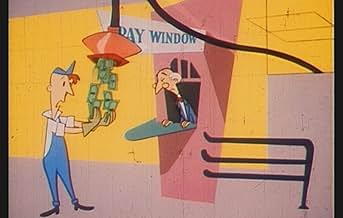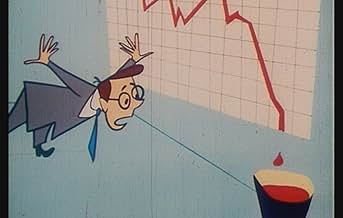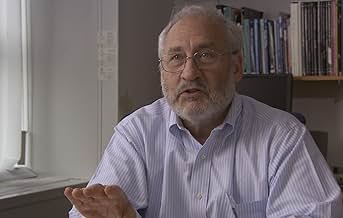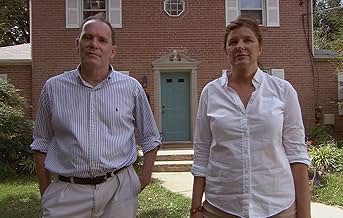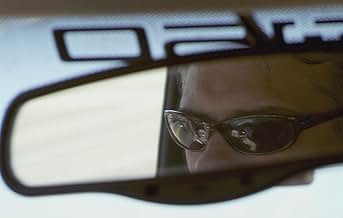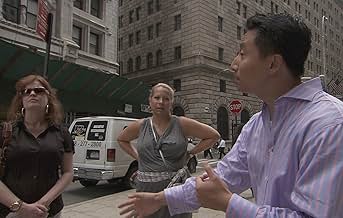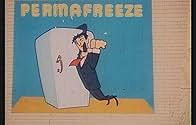Ajouter une intrigue dans votre langueAn examination of the causes of the economic crisis of 2008.An examination of the causes of the economic crisis of 2008.An examination of the causes of the economic crisis of 2008.
- Récompenses
- 1 nomination au total
Avis à la une
Only 2 reviews for this remarkable film? I leave the spoiler box unchecked, but really, the film is a "spoiler" since it refers to the most recent crash, a veritable implosion of the global economy based partially on mortgage backed securities.
The film is British, so at the very least we have a fine mix of American and British academics in economics giving slightly different, but converging approaches to what happened.
I've seen a number of films on the crash (fictional and documentary), and this one is by far the best. The film is technical at times, but this is necessary. Nowadays, many of the actors involved in the financial sector are "financial engineers." The days of simplicity are long gone. It's all algorithms and computers now.
The film strikes a perfect balance between archival footage, expert discussion, and interviews with "real people" who were caught up in the real estate binge. And not all of those who bought houses were speculators, some just wanted a decent place to live, and maybe to use that decent place to consolidate debts.
The title "The Flaw" seems to have come from testimony given by Greenspan who referred to a flaw in his own ideology. The irony of this Randian admitting a problem with his ideology should not be taken for granted.
I walked away from this film wanting to watch it again. I hope more people will watch this film. This is not some kind of anti-capitalist diatribe. Instead the film methodically and subtly point out something we all know intuitively; capitalism as it presently functions cannot be sustained.
There are no simple answers. Only some terrifying questions. And by the way, nothing was solved by the bailouts that wasn't short term. Nothing.
The film is British, so at the very least we have a fine mix of American and British academics in economics giving slightly different, but converging approaches to what happened.
I've seen a number of films on the crash (fictional and documentary), and this one is by far the best. The film is technical at times, but this is necessary. Nowadays, many of the actors involved in the financial sector are "financial engineers." The days of simplicity are long gone. It's all algorithms and computers now.
The film strikes a perfect balance between archival footage, expert discussion, and interviews with "real people" who were caught up in the real estate binge. And not all of those who bought houses were speculators, some just wanted a decent place to live, and maybe to use that decent place to consolidate debts.
The title "The Flaw" seems to have come from testimony given by Greenspan who referred to a flaw in his own ideology. The irony of this Randian admitting a problem with his ideology should not be taken for granted.
I walked away from this film wanting to watch it again. I hope more people will watch this film. This is not some kind of anti-capitalist diatribe. Instead the film methodically and subtly point out something we all know intuitively; capitalism as it presently functions cannot be sustained.
There are no simple answers. Only some terrifying questions. And by the way, nothing was solved by the bailouts that wasn't short term. Nothing.
"The capitalism in the last thirty years has decreased the standard of living for everyone except at the top."
This was the statement of Louis Hyman, an economic historian. I'm mentioning this statement because it was in respects to the more surprising issue behind the '08 financial collapse. Everyone heard the term "subprime mortgages" and everyone believed that that was the core issue behind the '08 financial collapse. What I never heard was "income inequality" which was mentioned in "The Flaw."
When wages stagnate for the poor and middle class, the only way an economy can keep humming is through borrowing and credit, i.e. Debt. When debt increases so does spending which increases the wealth of the top 10%. Debt can only increase by so much before defaults happen and then it all comes tumbling down. But, as Hyman pointed out, it begins with outrageous income inequality.
Of course, there were a lot of other factors mentioned for the '08 crisis: CDO's (Collateralized Debt Obligations), sector rotation, asset market, and more. This 80 minute documentary was very informative and educational. It's been fourteen years since 2008, but it still seems like only yesterday. Furthermore, the way home prices have skyrocketed in the last decade I can only wonder what will cause them to plummet again, and who/what will be to blame this time. Again it seems like the government is behind the curve on the economy and does too little too late.
Free with Amazon Prime.
This was the statement of Louis Hyman, an economic historian. I'm mentioning this statement because it was in respects to the more surprising issue behind the '08 financial collapse. Everyone heard the term "subprime mortgages" and everyone believed that that was the core issue behind the '08 financial collapse. What I never heard was "income inequality" which was mentioned in "The Flaw."
When wages stagnate for the poor and middle class, the only way an economy can keep humming is through borrowing and credit, i.e. Debt. When debt increases so does spending which increases the wealth of the top 10%. Debt can only increase by so much before defaults happen and then it all comes tumbling down. But, as Hyman pointed out, it begins with outrageous income inequality.
Of course, there were a lot of other factors mentioned for the '08 crisis: CDO's (Collateralized Debt Obligations), sector rotation, asset market, and more. This 80 minute documentary was very informative and educational. It's been fourteen years since 2008, but it still seems like only yesterday. Furthermore, the way home prices have skyrocketed in the last decade I can only wonder what will cause them to plummet again, and who/what will be to blame this time. Again it seems like the government is behind the curve on the economy and does too little too late.
Free with Amazon Prime.
This is Communist propaganda. It omits so many of the actual catalysts for the 2008 collapse.
I would not recommend watching this program. Watch The Big Short instead. Far more accurate and educational.
I would not recommend watching this program. Watch The Big Short instead. Far more accurate and educational.
1nwnz
Typical socialist/statist claptrap. Maoist propagandists would be proud.
An extremely interesting look at the problems associated with capitalism in America. This documentary goes hand in hand with Michael Moore's CAPITALISM: A LOVE STORY, although there's more of an emphasis on helping the viewer to understand technicalities (whereas Moore focused on showing the human side of the story).
I came out of it with a better grasp of Wall Street, the real estate market, boom and bust and consumer society in general, which is no mean feat. The voice over narration is well judged, the graphs extremely useful and there are no dull bits. The use of old cartoons and film clips adds comedy to a documentary you wouldn't think of as amusing. Recommended.
I came out of it with a better grasp of Wall Street, the real estate market, boom and bust and consumer society in general, which is no mean feat. The voice over narration is well judged, the graphs extremely useful and there are no dull bits. The use of old cartoons and film clips adds comedy to a documentary you wouldn't think of as amusing. Recommended.
Le saviez-vous
- ConnexionsFeatures It's Everybody's Business (1954)
Meilleurs choix
Connectez-vous pour évaluer et suivre la liste de favoris afin de recevoir des recommandations personnalisées
- How long is The Flaw?Alimenté par Alexa
Détails
- Date de sortie
- Pays d’origine
- Site officiel
- Langue
- Voir plus de crédits d'entreprise sur IMDbPro
- Durée
- 1h 18min(78 min)
- Couleur
Contribuer à cette page
Suggérer une modification ou ajouter du contenu manquant


